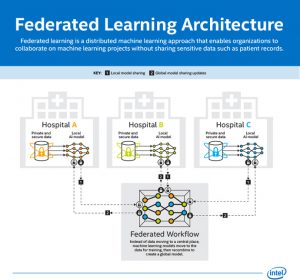 EMERGING TECH
EMERGING TECH
 EMERGING TECH
EMERGING TECH
 EMERGING TECH
EMERGING TECH
Intel Labs and the Perelman School of Medicine at the University of Pennsylvania today released a joint research study that used federated learning, a distributed machine learning and artificial intelligence approach, to help healthcare and research institutions identify malignant brain tumors.
The study is said to be the largest medical federated learning study ever undertaken, with an unprecedented global dataset. Using data from 71 institutions across six continents, the project demonstrated the ability to improve brain tumor detection by 33%.
Intel argues that data accessibility has long been an issue in healthcare because of state and national data privacy laws, including the Health Insurance Portability and Accountability Act. Because of the act, medical research and data sharing at large scale have been almost impossible without compromising patient health information. Intel’s federated learning hardware and software comply with data privacy concerns and preserve data integrity, privacy and security through confidential computing.
The Penn Medicine-Intel study involved processing high volumes of data in a decentralized system using Intel federated learning technology paired with Intel Software Guard Extensions to remove data-sharing barriers that have prevented collaboration on similar cancer and disease research. The system addresses data privacy concerns by keeping raw data inside the data holders’ compute infrastructure and only allowing model updates computed from that data to be sent to a central server or aggregator, not the data itself.
“In this study, federated learning shows its potential as a paradigm shift in securing multi-institutional collaborations by enabling access to the largest and most diverse dataset of glioblastoma patients ever considered in the literature, while all data are retained within each institution at all times,” explained senior author Spyridon Bakas, assistant professor of Pathology & Laboratory Medicine and Radiology at Penn Medicine. “The more data we can feed into machine learning models, the more accurate they become, which in turn can improve our ability to understand and treat even rare diseases, such as glioblastoma.”
 Accessing large amounts of medical data, including datasets that exceed the threshold that one facility can produce, is key to the technology. The research demonstrates the effectiveness of federated learning at scale and the potential benefits the healthcare industry can realize when multisite data silos are unlocked.
Accessing large amounts of medical data, including datasets that exceed the threshold that one facility can produce, is key to the technology. The research demonstrates the effectiveness of federated learning at scale and the potential benefits the healthcare industry can realize when multisite data silos are unlocked.
The benefits of Intel’s technology include early detection of disease, which could improve quality of life or increase a patient’s lifespan.
“Federated learning has tremendous potential across numerous domains, particularly within healthcare, as shown by our research with Penn Medicine,” said Jason Martin, a principal engineer at Intel Labs. “Its ability to protect sensitive information and data opens the door for future studies and collaboration, especially in cases where datasets would otherwise be inaccessible.”
Having completed the study, Intel Labs and Penn Medicine have created a proof of concept for using federated learning to gain knowledge from data. The solution can significantly affect healthcare and other study areas, particularly among different types of cancer research.
Support our mission to keep content open and free by engaging with theCUBE community. Join theCUBE’s Alumni Trust Network, where technology leaders connect, share intelligence and create opportunities.
Founded by tech visionaries John Furrier and Dave Vellante, SiliconANGLE Media has built a dynamic ecosystem of industry-leading digital media brands that reach 15+ million elite tech professionals. Our new proprietary theCUBE AI Video Cloud is breaking ground in audience interaction, leveraging theCUBEai.com neural network to help technology companies make data-driven decisions and stay at the forefront of industry conversations.